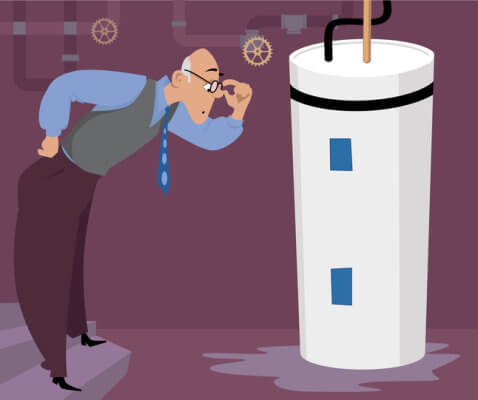How to Handle a Broken Water Heater in Your Home
Water heaters tend to last around 10-15 years if properly maintained, but they can show signs of wear long before they actually break. If you start to notice leaking around the lines, it could cause damage to your flooring and drywall as well as cause the water heater to fail. Rust and sediment can also settle in the bottom of the water heater causing the water heater to fail, or you may have the wrong size causing the unit to burst without warning. Whatever the case may be, if your water heater breaks here are some tips on what to do next.
What to do When Your Water Heater Breaks

- Turn off the Water – Turn off the water valve on your water heater. If it won’t turn off, shut off your home’s main water supply. If your water heater has burst, locate the cold water supply pipe leading from your home’s main water line into the top of the water heater. Turn off the cold water supply line by turning the valve clockwise. This stops the flow of water filling the hot water heater.
- Turn off the Power – An electric or gas heating element can pose new hazards if left running. It can stay hot long after water is out of the tank which wastes energy and could also start a fire. Locate and flip the breaker for your hot water heater on your breaker box. If your hot water heater is gas-powered, turn off the gas line leading into it and leave the house until the natural gas smell is gone.
- Drain the Water Heater – Attach a hose to the drain valve at the bottom of your water heater’s tank. Run the other end of the hose to a lower area where you can drain dirty water without risking more damage. Open the drain valve and flip the relief valve handle to prevent a vacuum from forming while the water drains.
- Rinse with Cold Water – After the water heater drains, open the water supply for a few minutes to flush any remaining sediment out of the water heater.
- File an Insurance Claim if Possible – Take photos of any structural elements or furniture that were damaged to help your insurance company determine the cost to repair or replace the items. Use a wet/dry vacuum to remove water from the area around the tank. Run a dehumidifier or floor fans to help prevent the growth of mold. Contact your insurance agent and be sure not to throw away your hot water tank as the insurance adjuster will need to see it to determine the cause of the burst and whether the company will pay for damages. When the insurance adjuster visits your home to assess the damage, show the photos you took and be ready to answer any questions he or she might have.
If you have any problems with your plumbing, call Bailey Brothers immediately night or day at 405-896-9988 for 24/7 service.
